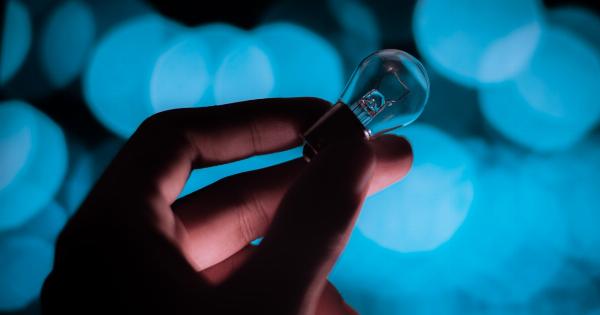Many people who wear contact lenses are guilty of falling asleep with them in at some point. It may seem convenient or harmless to leave them in overnight, but this habit can have serious consequences for your eye health.
Sleep should be a time for rest and rejuvenation, and this includes giving your eyes a break from contact lenses. In this article, we will explore the reasons why it is crucial to remove your contact lenses before going to sleep.
The importance of oxygen
One of the primary reasons to avoid sleeping with your contact lenses is that it inhibits the flow of oxygen to your cornea. The cornea, the clear front surface of your eye, depends on oxygen from the atmosphere to stay healthy and function properly.
When you wear contact lenses, they act as a barrier between your cornea and the air, reducing the amount of oxygen that can reach your eyes. This deprivation of oxygen can lead to various complications, including corneal swelling, infections, and even corneal neovascularization.
Potential for eye infections
Leaving your contact lenses in while sleeping creates a breeding ground for bacteria and other microorganisms.
During the day, your eyes can naturally clean themselves and flush out foreign particles, but when you sleep, this natural cleaning process is hampered. The combination of reduced oxygen flow and the accumulation of debris on your lenses creates the ideal environment for microbial growth.
This increased risk of eye infections can lead to conditions such as conjunctivitis, keratitis, and even more severe issues like corneal ulcers.
These infections can cause discomfort, blurred vision, sensitivity to light, and in some cases, permanent vision loss. It is always better to err on the side of caution and remove your contact lenses before going to sleep to minimize the risk of these complications.
Dryness and discomfort
Wearing contact lenses for an extended period, especially while sleeping, can result in dry eyes. When your eyes are continually covered by lenses, they are unable to naturally lubricate themselves, leading to dryness and discomfort.
Dry eyes can cause irritation, redness, a gritty sensation, and even excessive watering as your eyes try to compensate for the lack of moisture.
This dryness can also make it challenging to remove your contact lenses when you wake up, as they can adhere to the surface of your eyes.
This can cause additional discomfort and even damage to the delicate tissues of the cornea if you try to force them out. To avoid these issues, it is best to remove your contact lenses before bed and allow your eyes to rest and rehydrate overnight.
Risks associated with extended wear lenses
Some people opt for extended wear contact lenses, which are designed to be worn continuously for an extended period, including while sleeping. While these lenses may offer convenience, they come with their own set of risks.
Extended wear lenses are typically made of a material that allows more oxygen to reach the cornea, reducing the risk of oxygen deprivation compared to traditional lenses. However, this does not completely eliminate the risk.
Extended wear lenses still pose a higher risk of infection and other complications compared to daily wear lenses. Even with the increased oxygen permeability, wearing these lenses overnight can still restrict oxygen flow to some extent.
Additionally, the longer you wear your lenses continuously, the higher the chances of protein and lipid deposits building up on the lens surface, leading to discomfort and increased infection risk.
Proper contact lens hygiene
It is essential to maintain proper hygiene when it comes to contact lens use. While sleeping with your lenses is generally not recommended, there may be situations where you unintentionally doze off with them in.
In such cases, it is crucial to follow the correct steps to minimize potential damage and risks to your eyes.
Firstly, if you wake up and realize you have fallen asleep with your contact lenses, do not panic. Avoid attempting to remove them immediately, as your cornea may be temporarily swollen from the lack of oxygen.
Begin by lubricating your eyes with preservative-free artificial tears or contact lens rewetting drops. Wait for a few minutes and try to blink gently to help rehydrate your eyes and make the removal process easier.
Once you feel your eyes are adequately lubricated, carefully remove your contact lenses according to the recommended technique provided by your eye care professional. Avoid rushing or pulling forcefully, as this can cause corneal abrasions or scratches.
After removing your lenses, thoroughly clean and disinfect them using the appropriate contact lens solution, following the instructions provided by the manufacturer.
Alternatives to sleeping with contact lenses
If you find yourself frequently falling asleep with your contact lenses or have the habit of napping with them, it may be worth considering alternative options.
Eyeglasses are an excellent alternative for when you need to rest your eyes, as they do not pose any risk of complications associated with wearing contact lenses.
Another option is to explore specialty contact lenses designed for extended wear. These lenses are specifically made for overnight use and are much safer than traditional lenses for this purpose.
However, it is crucial to consult with your eye care provider before switching to these lenses, as they may not be suitable for everyone.
Caring for your eyes
Ultimately, the health and well-being of your eyes should always be a priority. It is essential to develop healthy habits when it comes to contact lens use and follow the guidelines provided by your eye care professional.
Avoid the temptation to sleep with your contact lenses in, even if it may seem convenient in the moment. By practicing good contact lens hygiene and giving your eyes the rest they need, you can ensure the longevity of your eye health and maintain clear vision for years to come.




























